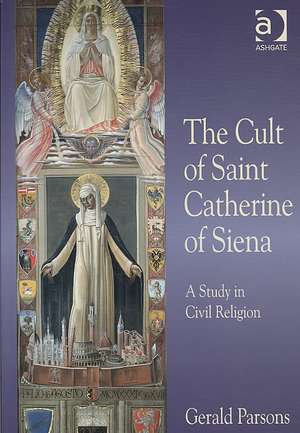The Cult of Saint Catherine of Siena: A Study in Civil Religion
Autor Gerald Parsonsen Limba Engleză Hardback – 16 sep 2008
Preț: 566.93 lei
Preț vechi: 749.37 lei
-24% Nou
Puncte Express: 850
Preț estimativ în valută:
108.48€ • 113.26$ • 89.78£
108.48€ • 113.26$ • 89.78£
Comandă specială
Livrare economică 15-29 martie
Doresc să fiu notificat când acest titlu va fi disponibil:
Se trimite...
Preluare comenzi: 021 569.72.76
Specificații
ISBN-13: 9780754656456
ISBN-10: 0754656454
Pagini: 202
Dimensiuni: 156 x 234 x 19 mm
Greutate: 1.25 kg
Ediția:1
Editura: Taylor & Francis
Colecția Routledge
Locul publicării:Oxford, United Kingdom
ISBN-10: 0754656454
Pagini: 202
Dimensiuni: 156 x 234 x 19 mm
Greutate: 1.25 kg
Ediția:1
Editura: Taylor & Francis
Colecția Routledge
Locul publicării:Oxford, United Kingdom
Cuprins
Contents: Preface; Introduction: civil religion and the cult of Catherine of Siena; 'La santa senese': Catherine and the civil religion of Siena 1384-1857; From 'santa senese' to 'Patrona d' Italia': the cult of Catherine of Siena 1859-1939; Catherine of Siena and the Second World War: 1940-1945; From 'Patrona d' Italia' to 'Patrona d' Europa': the cult of Catherine of Siena 1946-2007; Conclusion: Catherine of Siena and the varieties of civil religion; Bibliography; Index.
Notă biografică
Gerald Parsons is Senior Lecturer in Religious Studies, Open University, UK.
Recenzii
At one level this book is an account of a Catholic saint: Catherine of Siena. At another it provides a ’history’ of Italy as it moves - at times unsteadily - from a collection of city states to a member of the European Union. The link can be found in the deployment of Catherine as a symbol of first Siena, then Italy and then Europe. It is a captivating tale. Grace Davie, University of Exeter, UK Civil religion has re-emerged as an important scholarly concept, and in this, Parsons' work is vital. He demonstrates the way in which the religious and the secular, the local and the national, combine to locate religious identity in an ever-changing form. In Siena over five centuries, the cult of St Catherine is shown to have been resilient, adaptable and ideologically promiscuous. Written with verve and clarity, Parsons bowls the reader along with rich examples combining in a story that ranges from medieval clerics to twentieth-century fascists. The story adds significantly to our understanding of the way religion adapts to different centuries and conditions, and can be warmly recommended to social, cultural and church historians. Callum G Brown, University of Dundee, UK Parsons has achieved a very sophisticated blending of popular religious devotion, church-state relations, and the ongoing interface between Roman Catholicism and modern politics. The Cult of St. Catherine of Siena explores the complex negotiations around the making of a late-medieval saint, but what is more fascinating, charts how the identity of an essentially local saint became intertwined with the ambivalent and frequently tense relationships between the Roman Catholic Church and Italian nationalism in the late nineteenth and twentieth centuries. The Cult of St. Catherine of Siena is based on wide-ranging research that draws upon the history of art, the history of celebration, commemoration, and memory, as well as documenting the intricate relationship between Catholic clerics and Italian po
Descriere
This book examines the origins, development and history of the cult of Saint Catherine of Siena. Gerald Parsons argues that the cult of Catherine of Siena constitutes a remarkable example of the cult of a particular saint which, across more than six centuries, has been the vehicle for an evolving sequence of civil religious rituals and meanings. He shows how the cult of this particular saint developed, firstly, as an expression of Sienese civil religion; secondly, as a focus for Italian civil religion; and finally into an expression of European civil religion. Instead of the predominantly devotional - and frequently essentially hagiographical - approach of much of the literature on Catherine of Siena, Parsons examines the significance of her cult from the perspective of civil religion and the social history of religion.
